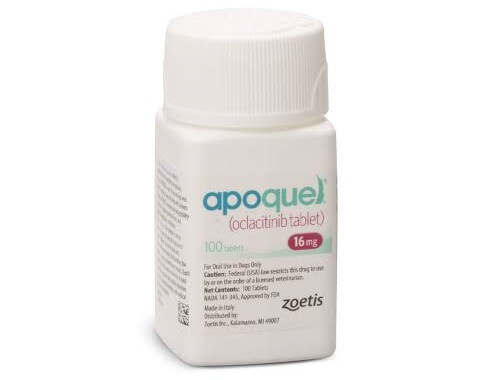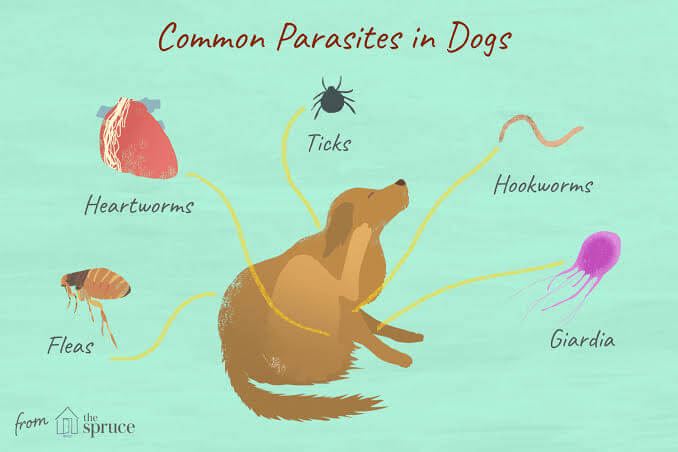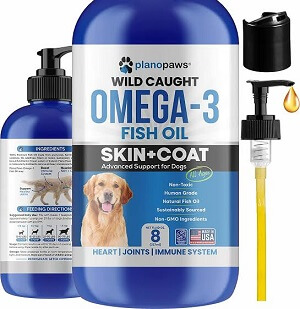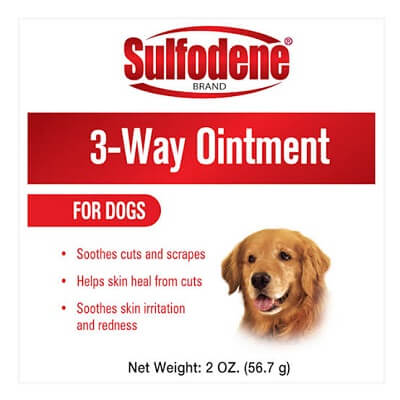Apoquel AlternativesIf you own a dog and your furry friend suffers from allergies on a regular basis, you are not alone. Uncontrollable scratching, excessive licking, chronic ear infections, and skin infections are all common symptoms of allergies that, if untreated, can quickly spiral out of control. Apoquel is used by many pet parents to treat their pet's uncomfortable allergy symptoms, and for good reason. Apoquel is one of the most effective medications for treating atopic and allergic dermatitis symptoms. It relieves itching and inflammation while having a few side effects. However, as with most medications, just because side effects are minor does not mean they do not exist, and there are circumstances in which Apoquel may not be the best first choice. 
What exactly is Apoquel?Apoquel is a JAK inhibitor, which means that while it reduces inflammation and itching, it also has a minor effect on the immune system and red blood cell production. This is not to say that Apoquel isn't a good option for many dogs; it is. It improves the quality of life for dogs suffering from atopic and allergic dermatitis. If your pet is prescribed Apoquel, it is very likely that they will be on it for a long time. Many dog owners consider alternative treatments because of the cost and potential side effects. Side effects of ApoquelWhile vomiting and diarrhoea are common side effects of many medications, including Apoquel, this medication also has its own set of concerning side effects. Apoquel works by interfering with kinase pathways in your dog's immune system. While this reduces skin irritation and itchiness, it also interferes with the immune system's ability to perform other critical tasks effectively. Apoquel, like other immune-suppressing drugs used in humans, has been linked to an increase in infection rates in dogs. Demodex mange, ear infections, and pneumonia are the most common infections. This drug cannot be used in dogs under a year old, who have naturally weaker immune systems, due to the risk of serious infection. There is also a risk of bone marrow suppression and a decrease in white blood cell count in all dogs. However, kinase pathways are not restricted to the immune system. They play an important role throughout the body. This could explain why dogs on Apoquel frequently experience unexpected side effects such as anorexia, lethargy, and increased cholesterol and blood lipase levels. The most concerning side effect of Apoquel is the possibility of an increase in cancer rates. Apoquel may "exacerbate neoplastic conditions," according to the third listed side effect on the box. This means that in laboratory tests, this drug was found to worsen preexisting cancers. Given how this drug works, this should come as no surprise. Apoquel reduces your dog's ability to fight cancer cells by interfering with normal immune system activity. While there is no evidence that Apoquel causes cancer cell growth, it's a safe bet that your dog is more likely to develop cancer while on the drug than if they weren't. In fact, in one long-term study, 5% of dogs taking Apoquel were diagnosed with cancer within 392 days of starting the medication. Increased cancer rates may be an acceptable risk for a drug used to prevent organ rejection, but you must decide whether this risk is worth it to help your dog find relief from chronic itching. As disturbing as Apoquel's side effects appear to be, the real danger of this drug, in my opinion, is how addictive it is to your dog's system. The Alternatives1. Managing Environmental Allergens
Dermatitis is never a disease in and of itself, but rather a symptom of a larger problem. Identifying and treating the source of the problem, rather than just the symptom, is much more likely to lead to a cure for your dog's itching. Given that allergies cause 70% of canine skin conditions, addressing environmental allergens is a good place to start. Around 90% of dogs with allergic dermatitis react to an allergen in the air or from surface contact. Dust mites, protein in flea saliva, and pollen are the three most common allergens. If your dog only gets itchy skin in the spring and fall, they are most likely suffering from seasonal allergies caused by plant pollen. With this diagnosis, you can at least use drug therapy sparingly. However, keep in mind that drugs like Apoquel frequently cause dependence and are difficult to wean your dog off of. Instead of resorting to drugs, some alternatives can significantly reduce and even cure your dog's underlying allergies. Using high-powered air purifiers indoors, changing HVAC filters regularly, and limiting your dog's exposure to known allergens such as grass can help significantly reduce symptoms. However, for dogs with extremely sensitive skin, multiple allergies, or severe allergies, this may not be sufficient. In this case, immunotherapy may be considered to cure your dog's allergies entirely potentially. Immunotherapy works in dogs in the same way that it does in humans. To determine what your dog is allergic to, tests are performed. The offending allergen is then gradually introduced into your dog's system through a series of shots or oral drops over days to weeks. The number of doses is reduced over time, while the amount of allergen per dose is increased. 2. Change Your Dog's Diet
So, what about the 10 to 15% of dogs who have allergic dermatitis but do not react to environmental allergens? These dogs are probably allergic to something in their food. While true food allergies are uncommon, food sensitivities and intolerances are far more common in dogs and can also cause red and itchy skin. If you suspect your dog's dermatitis is caused by something in their food, an elimination diet is the best way to find relief. An elimination diet involves removing all potential allergens from your dog's diet and then gradually reintroducing foods one at a time after symptoms have subsided. So, how do you identify potential allergens or intolerances? Simply put, any food ingredient to which your dog has been exposed in the last few years is a potential allergen. Beef, dairy, chicken, wheat, soy, lamb, corn, and eggs are the most common dog allergies, in that order. However, any food to which your dog has previously been exposed can cause an allergic reaction. Examine the ingredients list on your dog's food bag. Make a list of every whole food ingredient you come across. While a dog may be allergic to synthetic vitamins, preservatives, and other minor ingredients, it is unlikely. Add any foods your dog has gotten as a treat, licked up from the floor, or flavours in their medications or supplements to that list. This is the list of foods that your dogs are not allowed to eat for the next few months. Your task now is to find a dog food that contains NONE of these ingredients. I would suggest looking for a limited ingredient diet with only one protein and one starch. If your list includes a lot of common proteins and vegetables, you might have to look for something with unusual ingredients, like venison and sweet potato or rabbit and oatmeal. Over the course of a few days, gradually transition your dog from their original food to the new food. Once they're completely on the new food, limit your dog's diet (including treats) to only items that aren't on the potential allergens list you made. This restricted diet must be maintained until your dog's symptoms improve. For skin allergies, this usually means waiting two to three months. If your dog's symptoms do not improve during this time, try a diet with different ingredients. If there is still no improvement, it is unlikely that you have a food allergy or sensitivity. Once your symptoms have subsided, you can reintroduce one food from the restricted list. For at least a month or two, feed only this modified diet. If your dog's symptoms return, you'll know he's allergic to the reintroduced food. Remove the food entirely from their diet, wait for symptoms to subside, and then try another food from the list. Ideally, after several trials, you will be able to find a complete and balanced diet with a variety of proteins and starches that your dog can eat without experiencing allergic dermatitis symptoms. Even if your dog does not have allergies or intolerances, food could be the culprit. A poor diet can result in a dry, brittle coat and itchy skin. If your dog isn't eating well, try switching to a food that has multiple quality named animal ingredients at the top of the ingredient list, no filler ingredients like corn or soy, and no synthetic dyes or preservatives. Look for a food with at least 25% protein and a high percentage of healthy fats. 3. Rule Out Parasites
Your dog's itchy skin journey most likely began with a battery of tests to rule out parasites such as fleas, mites, and other skin infections. (If it didn't, this is something you should do right now.) However, these tests frequently miss common causes of dermatitis. Flea allergies are most common in dogs with very few fleas, and it only takes one bite to cause a week of itching misery. This minor or intermittent infestation is easily missed in the vet's office and should not be ruled out simply because there is no visible flea dirt. Mange can also be misdiagnosed. Some mites live so deep within the dermal layer that they are difficult to detect with standard skin scrapings and may require repeat testing to diagnose. If your dog has other symptoms of mange, but your initial test was negative, you should consult your veterinarian about additional tests. Some dogs, particularly those with thyroid issues or other environmental allergies, may be allergic to staph bacteria. This microbial can be found on almost any surface, including the skin of a healthy animal. This, as well as many other infections that cause allergic reactions, can only be diagnosed using blood tests that detect antibodies. If your dog's allergic dermatitis is caused by an environmental or contact allergen or infection, this may be a practical step. Veterinarians sometimes prescribe antibiotics to rule out bacterial-induced dermatitis. While this can be a useful diagnostic tool, keep in mind that some infections require multiple rounds of antibiotics to eradicate, and yeast infections, which are frequently exacerbated by antibiotics, can also cause itchy skin. The most important thing to remember here is to consult with your veterinarian and exhaust all possibilities before ruling out an infection, parasitic or otherwise, as the cause of your dog's itchy skin. You should even consider taking your dog to a veterinary dermatologist. 4. Supplements
Supplements, like switching your dog to a higher quality food, can help with itchy skin. When discussing itchy skin, one of the first supplements that come to mind is fish oil. This is due to the high concentration of omega fatty acids in this oil. Omega-3 fatty acids are essential for your dog's skin and overall health, and they can be especially effective in relieving itch. In fact, using an omega supplement alone reduces itching in about 20% of dogs with dermatitis. Because these fatty acids are a healthy addition to any dog's diet, there is no reason not to try them. Digestive enzyme and probiotic blends designed specifically for dogs can also help relieve itching, especially if your dog has an undiagnosed food sensitivity or intolerance. Enzymes aid in the digestion of certain foods in your dog's stomach. If your dog lacks a specific enzyme or does not produce enough on their own, food can pass through the system undigested, resulting in an unnecessary immune response or nutritional deficits, which can lead to itchy skin. Similarly, probiotic organisms aid in the breakdown of particles in the gut that your dog is unable to digest. Healthy intestinal flora is essential for your dog's absorption of nutrients, including many essential for skin and coat health. Yucca and quercetin are also excellent natural Apoquel substitutes. Yucca has a similar effect to steroid drugs but without negative side effects. Quercetin is a plant derivative that acts as a natural antihistamine and is an excellent alternative for dogs whose itching is controlled by Benadryl. 5. Topical Treatments
A variety of topical balms and ointments are available for dogs with itchy skin. Many owners find these products useful, particularly for flare-ups and hot spot treatments. But you don't have to spend a fortune on ready-made remedies to find relief for your pup's itchy skin. Many common items, perhaps even some in your pantry, can be used to soothe your dog's itchy skin. Coconut oil has antibacterial and healing properties, making it an excellent natural skin moisturizer. It can be used directly on the skin or combined with a few drops of lavender or peppermint essential oil for a truly relaxing skin treatment. Green tea, chamomile tea, baking soda, oatmeal, and apple cider vinegar are all-natural anti-inflammatory products that can be mixed with water for a therapeutic soak. While it may take some effort to get your dog to stay still long enough to reap the benefits, they will most likely thank you for your tough love once they feel the relief.
Next TopicBirthday Cake Alternatives
|
 For Videos Join Our Youtube Channel: Join Now
For Videos Join Our Youtube Channel: Join Now
Feedback
- Send your Feedback to [email protected]
Help Others, Please Share









